The American Society for the Prevention of Cruelty to Animals (ASPCA) is a non-profit organization dedicated to preventing cruelty to animals. Based in New York City since its inception in 1866, the organization's mission is "to provide effective means for the prevention of cruelty to animals throughout the United States."

An animal shelter or pound is a place where stray, lost, abandoned or surrendered animals – mostly dogs and cats – are housed. The word "pound" has its origins in the animal pounds of agricultural communities, where stray livestock would be penned or impounded until they were claimed by their owners.
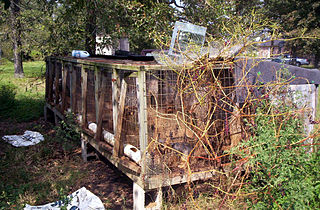
A puppy mill, also known as a puppy farm, is a commercial dog breeding facility characterized by quick breeding and poor conditions. Although no standardized legal definition for "puppy mill" exists, a definition was established in Avenson v. Zegart in 1984 as "a dog breeding operation in which the health of the dogs is disregarded in order to maintain a low overhead and maximize profits". The Veterinary Medical Association of the Humane Society of the United States defines the main characteristics of a puppy mill as "emphasis on quantity over quality, indiscriminate breeding, continuous confinement, lack of human contact and environmental enrichment, poor husbandry, and minimal to no veterinary care."

The Australian National Kennel Council (ANKC) is the coordinating kennel club of Australia. The ANKC is a member of the Fédération Cynologique Internationale.

Cruelty to animals, also called animal abuse, animal neglect or animal cruelty, is the infliction by omission (neglect) or by commission by humans of suffering or harm upon non-human animals. More narrowly, it can be the causing of harm or suffering for specific achievements, such as killing animals for entertainment; cruelty to animals sometimes encompasses inflicting harm or suffering as an end in itself, defined as zoosadism.

The Animal Welfare Act was signed into law by President Lyndon B. Johnson on August 24, 1966. It is the main federal law in the United States that regulates the treatment of animals in research and exhibition. Other laws, policies, and guidelines may include additional species coverage or specifications for animal care and use, but all refer to the Animal Welfare Act as the minimally acceptable standard for animal treatment and care. The USDA and APHIS oversee the AWA and the House and Senate Agriculture Committees have primary legislative jurisdiction over the Act. Animals covered under this Act include any live or dead cat, dog, hamster, rabbit, nonhuman primate, guinea pig, and any other warm-blooded animal determined by the Secretary of Agriculture for research, pet use or exhibition. Excluded from the Act are birds, rats of the genus Rattus, mice of the genus Mus, farm animals, and all cold-blooded animals.
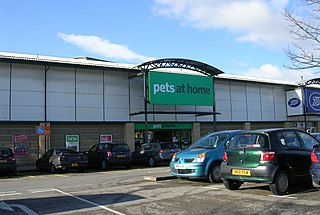
A pet shop or pet store is a retail business which sells animals and pet care resources to the public. A variety of animal supplies and pet accessories are also sold in pet shops. The products sold include: food, treats, toys, collars, leashes, cat litter, cages and aquariums. Some pet stores provide engraving services for pet tags, which have the owner's contact information in case the pet gets lost.
A backyard breeder is an amateur animal breeder whose breeding is considered substandard, with little or misguided effort towards ethical, selective breeding. Unlike puppy mills and other animal mill operations, backyard breeders breed on a small scale, usually at home with their own pets, and may be motivated by things such as monetary profit, curiosity, to gain new pets and/or working animals, or to show children "the miracle of birth".

Animal roleplay is a form of roleplay where at least one participant plays the part of a non-human animal. As with most forms of roleplay, its uses include play and psychodrama.
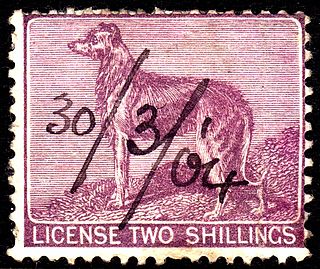
A dog licence is required in some jurisdictions to be the keeper of a dog. Usually a dog-licence identifying number is issued to the owner, along with a dog tag bearing the identifier and a contact number for the registering organization. If a stray pet is found with the tag, a rescuer can call the registering organization to get current contact information for the animal.

Dogs Trust, known until 2003 as the National Canine Defence League, is a British animal welfare charity and humane society which specialises in the well-being of dogs. It is the largest dog welfare charity in the United Kingdom, caring for over 15,000 animals each year. Dogs Trust's primary objective is to protect all dogs in the UK and elsewhere from maltreatment, cruelty and suffering. It focuses on the rehabilitation and rehoming of dogs which have been either abandoned or given up by their owners through rehoming services.
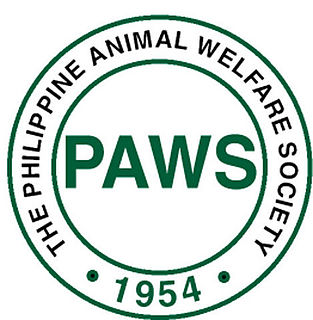
The Philippine Animal Welfare Society (PAWS) is a volunteer-based, non-government organization whose goal is to prevent animal cruelty through education, animal sheltering and advocacy, based in Quezon City, Philippines. PAWS believes that the creation of a more peaceful society starts with the widening of mankind's circle of compassion which includes animals, thereby envisions a nation that respects animals, practices responsible pet ownership and protects wildlife. The volunteer-based organization rehabilitates these animals in the hope of finding them new homes and a second chance at a good life. PAWS does not take in pets of other people, but only victims of cruelty or neglect where the animal offenders are charged with violation of the Animal Welfare Act in court.
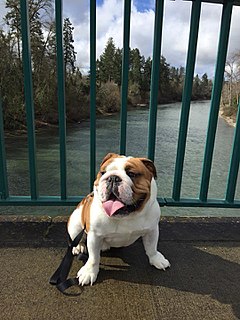
Pet rental is the practice, usually administered by for-profit companies, of renting pets such as dogs and cats. Rental also includes animals who are hired out at a specific rate for a specific time. It is a controversial practice opposed by many animal rights advocates and has been banned in at least one municipality: Boston, Massachusetts.
The National Animal Interest Alliance (NAIA) is a non-profit organization in the United States dedicated to promoting animal welfare and animal husbandry practices, strengthening the human-animal bond, and safeguarding the rights of responsible animal owners and professionals through research, public education and public policy. The NAIA mission is "to promote the welfare of animals."
The National Animal Welfare Trust (NAWT) is an animal welfare charity founded in 1971, which operates rescue and rehoming centres for companion animals. It has branches in Watford, Berkshire, Essex, Bedfordshire and Cornwall. They operate a number of premises, including Trindledown Farm, the UK's only retirement home for elderly pets. Formerly known as the Animal Welfare Trust (AWT), it originated from the British Union for the Abolition of Vivisection.

Petland is a privately owned operator and franchisor of pet stores based in Chillicothe, Ohio. Ed Kunzelman founded the company in 1967. Petland currently operates 131 stores in the United States, and at least 63 in foreign markets including Canada, Japan, China, Mexico, Brazil and El Salvador. The chain is notable for its controversy over documentation from the Humane Society of the United States revealing the purchase of dogs from puppy mills.
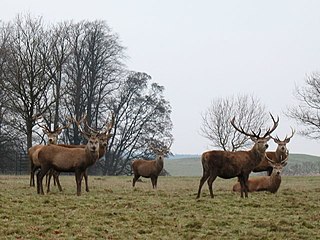
Animal welfare in the United Kingdom relates to the treatment of animals in fields such as agriculture, hunting, medical testing and the domestic ownership of animals. It is distinct from animal conservation.
Animal welfare and rights in Indonesia regards the treatment of and laws concerning non-human animals in Indonesia. Indonesia has limited animal welfare regulations by international standards.
The British Columbia Society for the Prevention of Cruelty to Animals is a non-profit animal welfare organization which advocates for animal protection legislation, operates animal shelters, and runs educational workshops and public awareness programs throughout British Columbia, Canada. Founded in 1896, it is a registered charitable organization and one of the largest such animal welfare organizations in North America. As of 2017, BC SPCA had 36 branches, over 500 staff members, nearly 5500 volunteers, operated 5 veterinary hospitals/clinics and a wildlife rehabilitation centre, and sheltered more than 22000 animals. It is also one of the few animal welfare organizations to monitor animals in film.
Dilyn is a dog which lives with UK Prime Minister Boris Johnson and his wife Carrie at 10 Downing Street. He is a white, male Jack Russell cross also known as a “Kromfohrlander” and was born in 2018.













